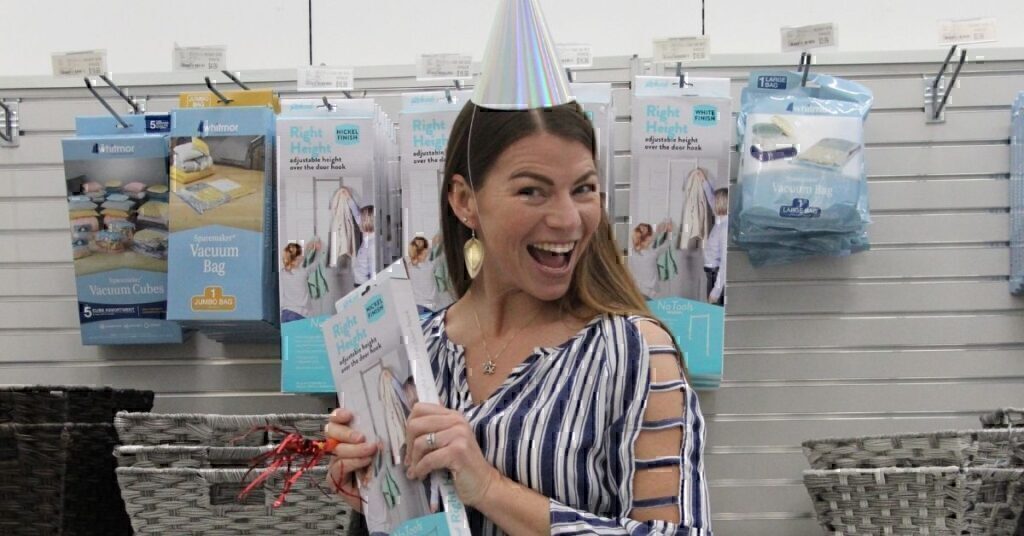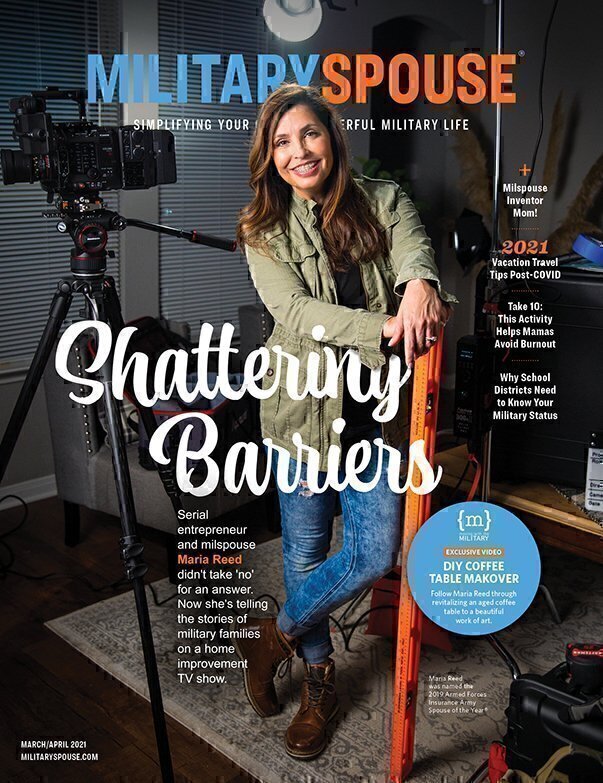See this and more in the March/April issue of Military Spouse Magazine!
We hosted a live Q&A with April, and you can rewatch it here!
April Mitchell is a Marine Corps spouse and homeschooling mom of four kids. But she doesn’t let those labels define her. These days, she is also proud to be called an inventor and entrepreneur.
This busy mom has a background in education and worked as a teacher before having kids. Mitchell says, “I never really planned to be an inventor. It happened because we had problems that needed to be solved.” And she soon realized others might need her solutions.
The first thing Mitchell invented was a Towel Belt to keep hand towels from sliding off the bar onto the dirty bathroom floor. She was tired of doing extra laundry every time someone washed their hands. “I thought this would be my only idea and invention, but after my first product I had another idea. I love learning and teaching.”
Since inventing her first product in 2008, Mitchell established an LLC named 4A’s Creations after her four children—Anthony, Alexander, Abraham, and Annabelle. Her creative ideas have expanded into the toy and game industry, where she is currently pitching 12 products. And now, you may be able to purchase one of her inventions at your Exchange!
Two years ago, Mitchell licensed an invention called Right Height—adjustable towel hooks that hang over a bathroom door. The height can be adjusted for children of different ages, or to accommodate someone with mobility issues. Mitchell credits the military lifestyle with inspiration for her invention.
“The idea came from living in military housing where there were never enough towel hooks, or they were in the wrong place. The kids were standing on the sink to reach their towels, so we needed something low enough for them to reach. I started researching and couldn’t find a thing, so I decided to make one. I’m very thankful for the military making us move and adjust to different houses because if I only lived in one house and had the perfect closet I wouldn’t have needed to invent this!”
During the pitching process, companies picked up Right Height to sell on Amazon and in major retail stores like Walmart. But Mitchell wanted the product to help military families too. Once it was manufactured, she gave away boxes at a Wounded Warrior event on Camp Pendleton. The companies Mitchell worked with didn’t have relationships with the military Exchanges, so she researched who to contact about selling her product on base. In November 2020, Right Height appeared on shelves in Marine Corps Exchanges in time for the holiday season.
Mitchell’s family came with her to see her product on the store shelves in Cherry Point and celebrate the long journey it took to get there.
“In a way, getting the product in the Exchange on base is coming full circle, because it’s a way of saying ‘thank you Marine Corps!’ for all the times they made us move.”
Mitchell admits that military life isn’t easy, and that in her early years as a military spouse when she stayed home raising kids, “I started losing who I was. I let being a mom and a military spouse define me. I’m proud of those things, but I felt like I was missing something because I wasn’t learning or exploring things or doing something for myself. I didn’t have a project to work on. Now we are showing our kids that Dad’s work is important, but Mom is doing important things too. I still teach, but not in a classroom.”
Mitchell’s family has been supportive and involved throughout the process. She enjoys sharing her work with the kids and letting them see what is possible when you allow your creativity to flow. She says,
“This was a journey we all went through together: my husband helped with computer tech, the kids were in the promo videos, and I received a patent, so it was really a celebration for all of us.”
The process from product concept to sales can take two years, but Mitchell has developed a process she consistently uses for marketing her ideas. She uses the strategy of licensing a product (so she owns the idea) and then pitching it to companies who are already located in big box stores. The large companies handle the manufacturing and distribution of the product, while she receives a percentage of the profits. According to Mitchell, “The whole idea is to do it cheaply and see if there is interest in your product. You can do most of this yourself for under $200 to get it in front of other companies, or hire help at certain steps like making a prototype and making a video. You want to constantly work on your next idea. You don’t want to create a business for each step of the process and get bogged down in the manufacturing and distributing of the product.”
Mitchell believes many military spouses have the gifts and ability to invent something. You don’t need to take specific classes or pay for a degree. She says, “Military spouses are smart and resourceful. We are problem solvers! My first drawing of the Right Height product was very primitive. If I can get a drawing like this turned into a product and sold in stores, then anything you can think of and put on paper has to be better!”
She is also a big advocate of using free resources like online groups for inventors or connecting with military spouses on LinkedIn.
“If anyone is trying to charge you just to look at your idea, don’t do that. Explore what you enjoy. Be persistent and open to learning, because you’re going to have to learn new things. Make that time for yourself and go for it!”
The Inventing Process, from Concept to Store Shelves
- The first step is market research—find out what else is out there that is similar. Evaluate it, improve it, think of changes to make it fit a wide market.
- Prototype it. Start with a virtual prototype just sketched on paper, then a physical product you can hold in your hands to show a video of it being used.
- Marketing material. Design your sell sheet that sells the benefits of the product. Demonstrate how it will make people’s lives better or easier. Make a video of it being used.
- Protect your concept. File a PPA (Provisional Patent Application.) This costs just $80 and gives you a year to figure out the details of your product. Your paperwork will say “Patent Pending” and give you perceived ownership.
- Pitching. Get your marketing material in front of companies so you can get feedback. Connect with companies through LinkedIn or email to figure out who to pitch.
- Finally, get it out into the marketplace!
Recommended Resources:
- “One Simple Idea” by Stephen Key This book outlines the steps in the process that Mitchell uses.
- “Become a Professional Inventor” by Stephen Key and “Licensing Ideas using LinkedIn by Stephen Key and Benjamin Harrison. Mitchell is featured in each of these books.
- inventRight TV has free YouTube videos for inventors




